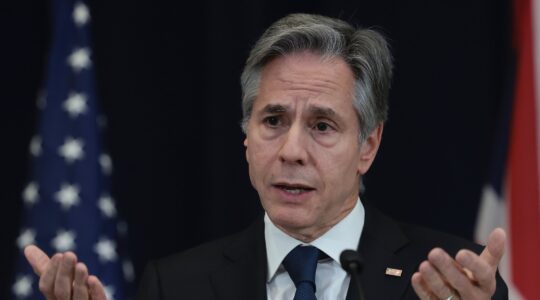JERUSALEM (JTA) – Ehud Olmert is fighting for his political life on three fronts: legal, political and in the court of public opinion.
The multi-pronged battle follows allegations that the prime minister may have violated campaign regulations or taken bribes as mayor of Jerusalem or minister of trade, industry and labor.
Olmert is said to have received hundreds of thousands of dollars – ostensibly as political campaign donations – between 1993 and 2006. The money allegedly came through Morris Talansky, an American fund-raiser, who handed over most of it in cash.
Several questions arise: Were the sums within the prescribed limits for Olmert’s campaigns? Was all the money declared in campaign records as required by law? If not, what happened to the undeclared funds?
Olmert could be in trouble even if he did not take bribes; showing that he breached campaign funding regulations knowingly would be enough to force his resignation.
The campaign funding laws in Israel are strict, complicated – and full of holes.
Donations are restricted to relatively small sums by individual donors, and a ceiling restricts the amount that can be spent in total for a campaign.
But the figures keep changing and vary for the types of elections – municipal, national, internal party primaries for Knesset candidates and internal party primaries for party leaders.
And there is a catch: The limits on campaign donations apply only to the nine months before an election and donations have no limits before the run-up.
President Shimon Peres, for example, received donations of $100,000 from American Jewish supporters Bruce Rapaport and Haim Sabban, and $120,000 from Slim-Fast magnate S. Daniel Abraham for the Labor Party leadership primaries in 2005.
But Peres was able to show that he received the funds before the critical nine-month period, that he registered all the donations and that he used the money for campaign purposes.
The Peres case sheds light on Olmert’s predicament: If Olmert received large sums in any nine-month run-up period, he could be guilty of violating campaign funding laws. And if he received large sums outside the nine-month periods but cannot show they were used for an election, he could be accused of taking bribes.
The police investigation apparently focuses on two areas: money Olmert received in 1999 to cover debts incurred in his 1998 race for Jerusalem mayor and funds received between 2003 and 2005. The funds for his mayoral race could involve campaign funding violations, and the later money, contributed without an election in the offing, could be construed as bribes.
Under Israeli law, it is considered a bribe if the state can show that a high-ranking elected official pocketed large sums. The state does not need to prove that any favors were sought or rendered.
In a TV interview with Israel’s Channel 10, Talansky argued that bribery is not an issue because he had no business interests in Israel and never considered making money in the country.
“It never crossed my mind,” he said.
According to Talansky, all the money raised was for Olmert’s political campaigns, and he made cash handovers because he had no bank account in Israel and Olmert did not have one in America.
Talansky couldn’t say whether all the money was used for campaign purposes.
“I just don’t know,” he said. “It’s very confusing.”
On the face of it, Olmert’s political survival will depend on his legal fortunes. But the prime minister also has a serious political and public opinion battle on his hands.
The results of a public opinion poll released Monday showed that 59 percent of Israelis believe Olmert should step down and 33 percent believe he should stay. Sixty percent of respondents do not believe Olmert’s claim that he did not pocket any of the money, while 22 percent believe the prime minister.
Perhaps the most crushing blow was in the poll’s election predictions, which showed that if Olmert were to stay at the helm for a new election, his Kadima Party would capture only 12 Knesset seats, compared to 28 for Likud and 19 for Labor.
But if Foreign Minister Tzipi Livni were to become the Kadima candidate for prime minister, the party would beat its rivals with 27 seats compared to Likud’s 23 and Labor’s 15.
It will be hard for Olmert to retain support in Kadima if it becomes clear he would be an electoral disaster compared with Livni’s expected strength.
Olmert is not taking any of this lying down.
Last week, at the end of Israel’s Independence Day, he delivered a calculated address to the nation in which he revealed part of his survival strategy.
First, he insisted that he had not taken any bribes. As to his alleged violations of campaign donation laws, he moved to shift the burden of responsibility to his once-close associate and former law partner Uri Messer.
Messer, an experienced lawyer, handled all the campaign funding, “presumably within the limits of the law,” Olmert said.
In other words Olmert, like Ariel Sharon and Ehud Barak before him, was claiming that if any campaign violations had taken place, they were without his knowledge. It was a strategy that worked for his two predecessors.
Most important, Olmert took the urgency out of the political maneuvering to unseat him by promising to resign if indicted. Israeli politicians are now saying Olmert must be given a fair chance to clear his name and that they will wait to see whether or not he is charged.
This could give Olmert months of breathing space and, if no charges are brought against him, he actually could survive as prime minister.
Olmert and his close supporters have made other moves to bolster his position. They organized a meeting of party activists to express support for the embattled prime minister; they tried to undermine the allegations against him by insinuating that it was all part of a right-wing conspiracy to destroy him after his political transformation from hawk to relative dove; and they moved to delay legal proceedings by appealing a court ruling that allowed Talansky to give pre-trial testimony.
Olmert, however, is weighed down by his history. He has been at the center of so many questionable financial dealings that the public seems reluctant to give him the benefit of the doubt.
Recently he has been targeted in no fewer than four police investigations: for allegedly trying to fix conditions for the sale of Bank Leumi to suit a friend – a case police now recommend should be closed; for allegedly buying, selling and renting two Jerusalem homes at discounted prices when buying and inflated prices when selling; and allegedly giving jobs to cronies when he was the minister of trade, industry and labor.
As several Israeli political pundits have noted, Sharon also had to contend with several parallel police investigations when he was prime minister.
But the difference between Olmert and Sharon is that Sharon easily could have won any ensuing election, while Olmert almost certainly cannot. More likely, Olmert may find himself a lame duck if Kadima unseats him as party leader before the next election.





